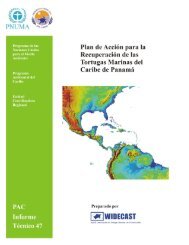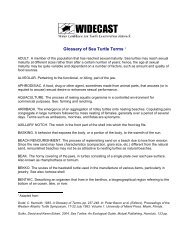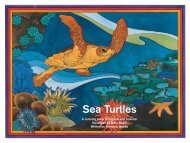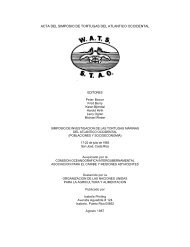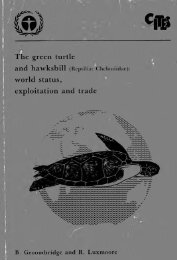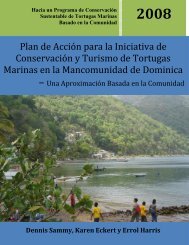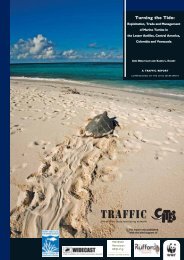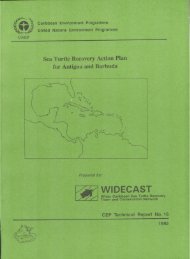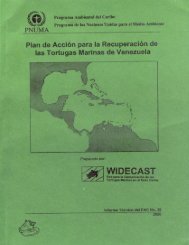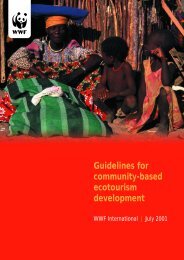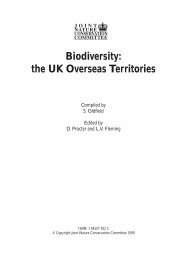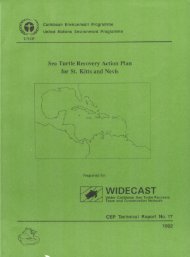Sea Turtle Recovery Action Plan for Barbados - WIDECAST
Sea Turtle Recovery Action Plan for Barbados - WIDECAST
Sea Turtle Recovery Action Plan for Barbados - WIDECAST
Create successful ePaper yourself
Turn your PDF publications into a flip-book with our unique Google optimized e-Paper software.
<strong>Barbados</strong> <strong>Sea</strong> <strong>Turtle</strong>s …<br />
- The TPD should grant permission to establish a protected beach hatchery if it becomes<br />
necessary (perhaps at Folkestone Park, St. James). A hatchery would allow threatened sea turtle<br />
nests to be relocated and their progress and hatching success to be closely monitored.<br />
4.613 National Conservation Commission (NCC)<br />
The National Conservation Commission (NCC) has an important role to play in the<br />
recovery plan <strong>for</strong> sea turtles in <strong>Barbados</strong>, both indirectly and directly. Employees of the<br />
Commission include beach park rangers and wardens, life guards, beach cleaners and a park<br />
naturalist (Folkestone Park and Marine Museum). Many of these personnel are working on<br />
beaches from early morning, and there<strong>for</strong>e have the potential to contribute greatly to the<br />
monitoring of sea turtle nesting and hatching activity. NCC employees are also engaged in<br />
"de-bushing" in ef<strong>for</strong>ts to beautify and enhance the safety of wastelands.<br />
Recommendations<br />
- De-bushing of areas within the coastal zone should be kept to a minimum in order to<br />
reduce soil erosion and the consequent deterioration of nearshore water quality resulting from an<br />
influx of sediment-loaded run-off.<br />
- Beach cleaning should be restricted to the raking of dead plant material and garbage,<br />
rather than the removal of living beach vegetation. It may be useful to legally protect beach<br />
vegetation, perhaps under the National Conservation Commission Act. Burning of beach<br />
garbage at numerous points along the East Coast road, followed by the burial of ashes and<br />
non-combustible items, is the method presently used <strong>for</strong> disposal of raked material. A small<br />
number of sites <strong>for</strong> the burning of garbage should be designated, and a method devised to<br />
transport garbage to these sites. Widespread burning of garbage on the beach is unsightly,<br />
causes pollution of the sand, kills embryos developing in eggs buried beneath the sand, and may<br />
deter turtles from using affected stretches of beach <strong>for</strong> nesting.<br />
- The participation of the NCC in turtle monitoring activities should be <strong>for</strong>malized. The<br />
ways in which the NCC staff can assist in turtle monitoring activities could be incorporated into<br />
a short series of talks and slide shows aimed at increasing the awareness of NCC employees<br />
about the beach environment. This series could be presented by the Bellairs Research Institute.<br />
4.614 Ministry of Agriculture, Food and Fisheries<br />
The Fisheries Division, a unit within the Ministry of Agriculture, Food and Fisheries, has<br />
as one of its functions to monitor public compliance with the Fisheries Regulation Act of 1904.<br />
The Fisheries Division is aware that the present legislation protecting sea turtles (see section 4.21<br />
<strong>for</strong> details) is insufficient.<br />
Recommendations<br />
- The Fisheries Division should pursue a permanent alteration to the Fisheries Regulation<br />
Act, giving full protection to sea turtles of all size classes and species, and prohibiting the use of<br />
Page 37



